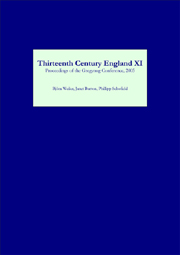Book contents
- Frontmatter
- Contents
- LIST OF ILLUSTRATIONS
- PREFACE
- CONTRIBUTORS
- ABBREVIATIONS
- ‘Adam of Bristol’ and Tales of Ritual Crucifixion in Medieval England
- Ethics and Office in England in the Thirteenth Century
- Some Aspects of the Royal Itinerary in the Twelfth Century
- The minority governments of Henry III, Henry (VII) and Louis IX compared
- Scottish Queenship in the Thirteenth Century
- Ethnicity, personal names, and the nature of Scottish Europeanization
- Power, Preaching and the Crusades in Pura Wallia c.1180–c.1280
- A Forgotten War: England and Navarre, 1243·4
- The Appointment of Cardinal-deacon Otto as Legate in Britain (1237)
- Matthew Paris and John Mansel
- The Burial of Noblewomen in Thirteenth-Century Shropshire
- Dynastic Conflict in thirteenth-century Laxton
- Absenteeism: The Chronology of a Concept
Dynastic Conflict in thirteenth-century Laxton
Published online by Cambridge University Press: 12 September 2012
- Frontmatter
- Contents
- LIST OF ILLUSTRATIONS
- PREFACE
- CONTRIBUTORS
- ABBREVIATIONS
- ‘Adam of Bristol’ and Tales of Ritual Crucifixion in Medieval England
- Ethics and Office in England in the Thirteenth Century
- Some Aspects of the Royal Itinerary in the Twelfth Century
- The minority governments of Henry III, Henry (VII) and Louis IX compared
- Scottish Queenship in the Thirteenth Century
- Ethnicity, personal names, and the nature of Scottish Europeanization
- Power, Preaching and the Crusades in Pura Wallia c.1180–c.1280
- A Forgotten War: England and Navarre, 1243·4
- The Appointment of Cardinal-deacon Otto as Legate in Britain (1237)
- Matthew Paris and John Mansel
- The Burial of Noblewomen in Thirteenth-Century Shropshire
- Dynastic Conflict in thirteenth-century Laxton
- Absenteeism: The Chronology of a Concept
Summary
The village of Laxton, formerly Lexington or Lessington, in east central Nottinghamshire owes most of its modern fame to the survival within it of a modified version of the system of open field agriculture, made famous by the great study of that system published in 1938 by the Orwins. There is, however, far more to the medieval history of Laxton than its open fields, as I hope to show by considering the contrasting nature and fortunes of the two most important families who lived in the village in the first half of the thirteenth century, and who came into legal conflict with each other at the century's mid-point. Their lives and the causes of their dispute serve to illustrate some important developments in English political, legal and social life which were then taking place, and provide an interesting story in themselves.
On 17 December 1249 John, son of the parson of Everingham, and Robert Scathlock are alleged to have broken into Robert of Lexington's park of Hartshorn at Laxton by force of arms and against the king's peace, with hatchets, Danish axes, bows and arrows, and chased out the beasts that were enclosed within it, on the orders of John of Everingham. A little earlier, on 30 November 1249, John son of the parson, Robert Feyteben and Ingram de Fanecurt had apparently seized Robert of Bilsthorpe, Robert of Lexington's man, in the vill of Laxton, and assaulted, mistreated and imprisoned him from daybreak until the third hour of the day, on the orders of Isabella of Everingham and her (younger) son John.
- Type
- Chapter
- Information
- Thirteenth Century England XIProceedings of the Gregynog Conference, 2005, pp. 193 - 214Publisher: Boydell & BrewerPrint publication year: 2007



